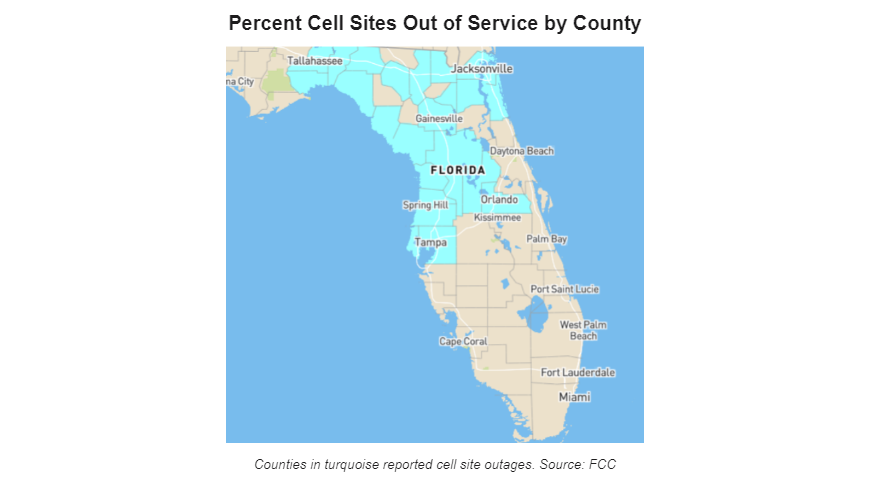So far, about 99 cell sites or one percent of the 9,627 cell sites in the affected counties are not working as a result of Tropical Storm Debby, which made landfall as a Category 1 Hurricane in Florida early Monday. That’s according to network outage information telecoms submitted to the FCC on Monday for the first Disaster Information Reporting System (DIRS) report following the storm. The storm is expected to bring significant flooding to parts of Florida, Georgia and South Carolina over the next several days, according to Yahoo News.
The following Florida counties are in the disaster area for Debby: Alachua, Baker, Bay, Bradford, Calhoun, Citrus, Clay, Columbia, Dixie, Duval, Escambia, Flagler, Franklin, Gadsden, Gilchrist, Gulf, Hamilton, Hernando, Hillsborough, Holmes, Jackson, Jefferson, Lafayette, Lake, Leon, Levy, Liberty, Madison, Marion, Nassau, Orange, Pasco, Pinellas, Putnam, Seminole, St. Johns, Sumter, Suwannee, Taylor, Union, Volusia, Wakulla, Walton, and Washington.
Baker and Jefferson counties have the most cell sites not working due to the storm. Out of 23 cell sites in Baker County, three are out of service. That’s just over 13 percent, according to DIRS.
Out of 38 cell sites in Jefferson County, five, also just over 13 percent, are not working because of power outages.
No 911 call centers in the DIRS area are impacted.
Cable and wireline companies reported 82,858 subscribers out of service in the disaster area for Hurricane Debby. This includes the loss of telephone, television, and/or internet services.
Two television stations reported being off the air. FM stations WAKU and WGLF also reported being off-air. No AMs were off the air as of Monday morning.
The FCC activated the Mandatory Disaster Response Initiative, which is essentially a cooperative agreement among telecoms. All facilities-based mobile wireless providers operating in the counties impacted by Debby are required to provide for roaming under disaster arrangements when technically feasible and help each other upon request during emergencies. They must also take measures to “enhance municipal preparedness and restoration” and increase consumer readiness and improve communications concerning service and restoration status.
By Leslie Stimson, Inside Towers Washington Bureau Chief





Reader Interactions